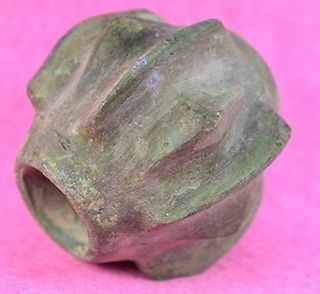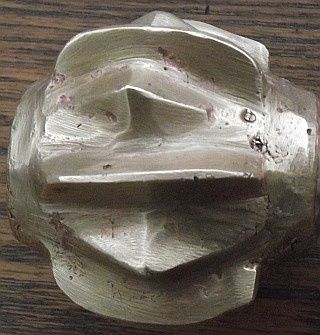
 |
|
|
#1 |
|
Member
Join Date: Mar 2010
Location: Wisconsin
Posts: 109
|
I have this interesting old jian pictured below and I was hoping to clean it up a little. Its a pretty long one at 33" total without the scabbard. Sorry about the mediocre pictures. I am trying to get this done quickly with kids abound on a Sunday morning. As you can see the brass dragon face guard is very heavily patina-ed. I have tried to oil it up and work it with a stiff nylon brush, and also scrubbed it with brass wool. Both had little to no effect. Does anyone have a suggestions related to brass clean-up that might help. Thanks you in advance for your input.
Last edited by Neil; 21st July 2013 at 10:48 PM. |
|
|

|
|
|
#2 |
|
Member
Join Date: Mar 2006
Location: Room 101, Glos. UK
Posts: 4,181
|
salt & vinegar paste works well on brass and bronze.
maybe too well. do you really want to remove all the patina? |
|
|

|
|
|
#3 |
|
Member
Join Date: Mar 2010
Location: Wisconsin
Posts: 109
|
Thank you for your thoughts. I am not familiar with that method. Could you describe the process and expected result.
To answer your question about removing all the patina. I have yet to use a chemical method that actually achieves this so I am not sure. I will have to put some thought into it. I am curious what you mean when you said the method may work "too well". |
|
|

|
|
|
#4 | |
|
Member
Join Date: Aug 2006
Posts: 608
|
Quote:
Hi Neil, To get a feel for the cleaning process, find the nastiest, dirtiest-looking penny you can, and drop it into a small coffee cup with about an ounce or two of vinegar and about a half-teaspoon of salt (stir well before immersing the penny). IMO I would not use it if that was my sword - provided it's original (which it appears to be from the photos), I sure wouldn't want to remove all that history.  Cheers, Chris |
|
|
|

|
|
|
#5 |
|
Member
Join Date: Mar 2006
Location: Room 101, Glos. UK
Posts: 4,181
|
that's exactly what i was referring to.
the salt & vinegar will remove ALL the patina, leaving a somewhat frosted bare metal surface. you can then polish it with metal polish to get a bright newly mint penny look, but all that history is down the drain. bronze 'roman' mace head bought from a balkan country for a few pounds via ebay. (it was an obvious chemically aged fake) before:  after:  polished with a brillo pad and later with brasso metal polish to get rid of the frosted look. object of the exercise, mounted as a walking stick:  had it been original, i would not have cleaned and polished it. for your sword, an original, what you have done so far should normally be sufficient. p.s. - if you do clean it, you'll need to clean the whole thing, guard & pommel, etc. or else it will not match & look horrible. degrease, use plain white vinegar. and refined white table salt (un-iodized). and try not to get any on the other parts. it cleans fairly quickly and doesn't produce any nasty fumes - it does smell a bit and will stain your hands. gloves recommended. wash off well with water and dry well, oil the sword after handling. i used vinegar with enough salt to make a saturated solution. Last edited by kronckew; 22nd July 2013 at 08:39 PM. |
|
|

|
|
|
#6 |
|
Member
Join Date: Oct 2012
Posts: 26
|
If the Jian was old is it sensible to clean it up too much? Over cleaning removes the history. The photographs are a bit unclear, I can see no build up of old dirt under the brass work on the wood. Has it already been cleaned or is it a recently made Chinese sword. I would like to see more pictures .
|
|
|

|
|
|
#7 | |
|
Member
Join Date: Jul 2006
Location: Buraimi Oman, on the border with the UAE
Posts: 4,408
|
Quote:
Salaams Neil, I know nothing about Chinese Jian save what I have learned on this thread and others. I have , however just placed a good cleaning tip...see http://www.vikingsword.com/vb/showth...8&page=4&pp=30 where I illustrate http://robertbeauford.net/cleaning_ancient_coins It is true that overcleaning can wreck objects, however, I think a study of the details contained in this site can be of some help. I too have questions .. Is the item old? Could this be a new item ? I have my suspicions.. Regards, Ibrahiim al Balooshi. |
|
|
|

|
|
|
#8 |
|
EAAF Staff
Join Date: Dec 2004
Location: Louisville, KY
Posts: 7,219
|
When it comes to brass and especially bronze, patina needs to be there or else the value is ruined. What you did with a tooth brush is plenty. Besides, many collectors like the patina and if no patina, then it looks recent (no good for resale).
|
|
|

|
|
|
#9 |
|
Member
Join Date: Mar 2010
Location: Wisconsin
Posts: 109
|
Thanks for your thoughts guys. Learning about the salt and vinegar method was very interesting. I will be adding it to my bag of tricks for sure.
In regards to the authenticity of the piece I am quite confident that it is a true antique example. This form with the stylized guard is well documented and appears to fall under the "later Qing era" category. That being said, its my opinion that this broad designation leaves a lot to be desired in telling the story of this sword and its past. These types of jian have really left me with a lot of questions. Related to their place of origin I have read others say they are from the Longquan area in the southwest part of Zhejiang Province. I have also read others theorize they were used by Chinese gentry as symbols of Chinese cultural identity in a Manchu governed country. As much as I appreciate hearing this and its potential for truth, I have yet to find out what evidence led others to these ideas. Honestly thats just the tip of the iceberg. For me the world of antique Chinese weapons is just one question after another. Of course thats the fun of it. I am still sitting on the fence on how to move forward with the clean-up. I agree with the other voices that the salt and vinegar method is a big step. I would personally prefer some middle ground between where it is now and the method just mentioned. I have another example I will photograph that is right at the happy medium I like. I will do my best to post some additional pictures of both pieces later today. In the mean time here are a couple photos of an old jian that someone went all the way on with the clean up. I think it looks pretty nice. If you were to rub your face with your fingers and then rub down the fittings periodically the brass would mellow quite nicely after a couple years. |
|
|

|
|
|
#10 |
|
Member
Join Date: Mar 2010
Location: Wisconsin
Posts: 109
|
Here are the additional pictures. The guard on the shorter jian definitely has a more refined casting. For my tastes its state of preservation is much nicer than the longer one. Of course the longer one is still a very interesting piece. Note the double dragons on the scabbard fitting.
Does anyone have any thoughts on the type of hide the scabbard is covered with. It is soft and relatively thin. The shorter jian was certainly sharpened for service and shows a high liklyhood of use. I thought others might appreciate the last picture of its edge geometries and wear marks. |
|
|

|
|
|
#11 |
|
Member
Join Date: Mar 2007
Posts: 407
|
Neil-
As you know dating Chinese things is problematic at best, but both jian appear to me to be perhaps over the boarder into the Republican era. The longer one in particular does not appear Qing. Longer jian supposedly are more common in the Republican period, and the double rivet in the handle is not something I have seen in Qing work. A closeup of the tip might reveal if it is sanmai and/or heat treated. I have bought a few from that period, and their construction is more varied than the already huge variation in Chinese things. The rather crude casting is typical of the period, and the blackening may have been intentional. If it was artificially aged in the 30's does that count as history? I have also seen a similar patina on a jian from circa 1870 collected in Sumatra, so enough heat and humidity can produce a similar result over time. One of my favorite jian is a 1930's or so copy of a Qing example that was carefully polished over its whole life. I love the bright look, but it has already mellowed hanging on my wall, compared to when it arrived, and I am not planning on polishing it. Anyway, I guess my answer would be polish it if you like it that way, but don't expect it to look right for a few years after. And please see if you can show the blade construction. For me that is the dividing line between a good sword and something for kids to hack away with as evidenced by the edge to edge damage. Josh |
|
|

|
 |
|
|